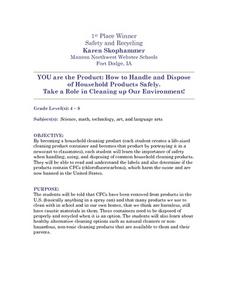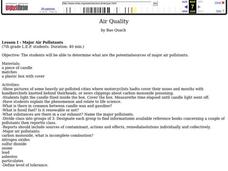Curated OER
The Ozone Between Us
Students investigate how ground level ozone occurs in many areas of the country. They study the ozone problems that are associated with population centers.
Curated OER
A Model of Earth's Atmosphere
Middle schoolers make a model of the four layers of Earth's atmosphere that represents the characteristics of each layer.
Curated OER
Trouble in the Troposphere
Learners Use data sets from MY NASA DATA to produce graphs comparing monthly and yearly ozone averages of several U.S. cities. They analyze and evaluate the data and predict trends based on the data. In addition, they discuss and...
Curated OER
How to Handle and Dispose of Household Products Safely
Students engage in the study of household cleaning products, how to read the labels and how to use them safely and also how to properly dispose of the containers when they are empty. They read the labels and determine if the products...
Curated OER
Greenhouse Effect
Young scholars investigate the greenhouse effect. For this environmental lesson, students investigate why the greenhouse effect changes the climate through an experiment. Young scholars use vinegar to simulate how acid damages the...
Curated OER
Effects of Ozone in the Air
Fifth graders learn how ground-level ozone is an air pollution problem. Students measure ozone levels and graph the results.
Curated OER
It's a bright and beautiful day...Protect Yourself!
Students investigate the cause and effect of skin cancer. They complete worksheets, view presentations and discuss the various types of ultraviolet rays and their impact on human health.
Curated OER
Environmental Issues in the Polar Regions
Pupils list environmental problems they are familiar with and check the ones they think affect the polar regions, and they research and answer questions about environmental issues affecting the polar regions. Students discuss their...
Curated OER
Creating and Analyzing Graphs of Tropospheric Ozone
Students create and analyze graphs using archived atmospheric data to compare the ozone levels of selected regions around the world.
Curated OER
As the Sun Burns
Students test commercial sunscreens or sunglasses for accuracy of their Sun Protection Factor. They devise a method for testing UV beads with a visual clues which they publish as research. They investigate occupations such as...
Curated OER
The Breathtaking Nature of the Urban Explosion, Part 2
Learners explore ozone levels. They measure the concentrations of ground-level ozone in the atmosphere. Students observe changes in the concentrations of ozone over time. Learners complete a data sheet to record ozone readings over a...
Curated OER
Science: Trouble in the Troposphere
Students research a NASA Website and record information about an assigned city's tropospheric ozone residual monthly climate. In groups, they graph the information for the past year. They form new groups and compare their city's...
Curated OER
Create Your Own Investigation
Young scholars design and implement an experiment intended to measure and analyze the air quality of a particular location. They focus on looking for ozone and particulate pollutants.
Wilderness Classroom
Pollution
Educate scholars on pollution—air, water, and land—with a series of lessons that begin with a thorough explanation of each type. Learners then take part in three activities to reinforce the importance of reducing pollution. They...
National Institute of Environmental Health Sciences
A Student Exploration of the Global Impacts of Climate Change on Human Health
Small efforts can have global impacts. Learners use data to analyze public health impacts on climate change. They read articles that present relative data about climate change and use the data to make conclusions about the impact on...
Curated OER
Greenhouse Effect: Pop Bottle Experiment
Young scholars explore global warming by conducting a weather experiment. In this greenhouse gas lesson plan, students define the greenhouse effect and the impact on our ozone layer. Young scholars utilize a soda pop bottle, floodlight...
Curated OER
LEARN NOT TO BURN!
Pupils observe the effect of different filter thickness on ultraviolet radiation and discover that ultraviolet radiation is necessary for the production and destruction of ozone.
Curated OER
Air Quality
Students determine potential sources of major air pollutants, explain how acid rain is generated and how it affects the environment, discuss global warming, and explore protective role of ozone and cause of ozone layer thinning. Lessons...
Curated OER
Air Quality Issues
Students identify the different layers of the atmosphere. They examine the different types of air pollutants. They also discover laws in effect that work to protect the environment.
Curated OER
Air Quality and Transportation
Second graders study about air pollution and the effects it has on our Earth. Students tally cars on a sheet that has been categorized as follows: One person in car, two persons in car, or three or more persons in car. Students go to...
Curated OER
Health, Pollution, and Safety: Why Should We Care?
Students examine the impact of reducing the carbon dioxide emissions. They identify ways alternative fuels can lessen the effect of emissions on communities. Working in teams they conduct research from various community and Internet...
Curated OER
How Pollution Disrupts Our Natural Environment
Learners conduct experiments to illustrate global warming. In this air pollution lesson plan, students first examine how a layer of greenhouse gasses might impact the earth's atmospheric temperature, then evaluate how the layer of...
Curated OER
Using Radiosonde Data From a Weather Balloon Launch
Student use radiosonde data from a weather balloon launch to distinguish the characteristics of the lower atmosphere. They learn the layers of the atmosphere. They graph real atmospheric data.
Curated OER
As the Sun Burns
Students examine the types of light the sun gives the Earth. They describe the electro-magnetic spectrum and how to protect themselves from different types of light. They identify the layers of the atmosphere as well.

























